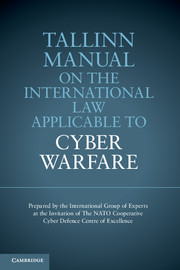Book contents
- Frontmatter
- Contents
- The International Group of Experts and Participants
- Short form citations
- Introduction
- Part I International cyber security law
- Part II The law of cyber armed conflict
- 3 The law of armed conflict generally
- 4 Conduct of hostilities
- 5 Certain persons, objects, and activities
- 6 Occupation
- 7 Neutrality
- Glossary
- Index
6 - Occupation
Published online by Cambridge University Press: 05 March 2013
- Frontmatter
- Contents
- The International Group of Experts and Participants
- Short form citations
- Introduction
- Part I International cyber security law
- Part II The law of cyber armed conflict
- 3 The law of armed conflict generally
- 4 Conduct of hostilities
- 5 Certain persons, objects, and activities
- 6 Occupation
- 7 Neutrality
- Glossary
- Index
Summary
The concept of occupation does not extend to non-international armed conflicts.
All members of the International Group of Experts agreed that territory is ‘occupied’ once it is actually placed under the authority of the hostile army. This occurs when the Occupying Power substitutes its own authority for that of the occupied territory’s government, which must have been rendered incapable of performing public functions. The occupation extends to the territory where such authority has been established and can be exercised. While some of the Experts were of the view that occupation includes situations in which a party to the conflict is in a position to substitute its authority, others took the position that actual exercise of authority is a condition precedent to occupation. Occupation ends as soon as the exercise of military authority over foreign territory ends or has otherwise become ineffective.
There is no legal notion of occupation of cyberspace. Furthermore, cyber operations cannot alone suffice to establish or maintain the degree of authority over territory necessary to constitute an occupation. However, cyber operations can be employed to help establish or maintain the requisite authority, for example, by enabling the issuance of certain notices required by the law of occupation to the population.
- Type
- Chapter
- Information
- Publisher: Cambridge University PressPrint publication year: 2013



